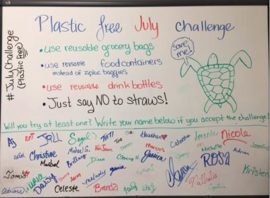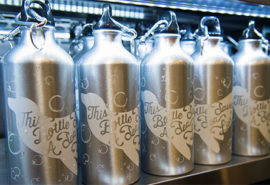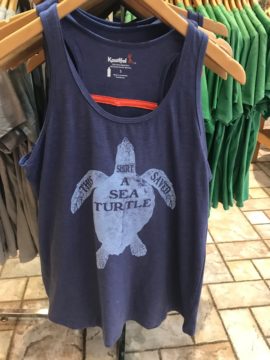How Food and Retail Partner, SSA is Helping the Zoo Achieve its Wildlife Saving Mission

Here at the Zoo, we believe that even the smallest of actions can help to save wildlife. During the month of July, we put our staff to the test, encouraging them to participate in Plastic Free July. For 31 days, over 250 Zoo staff and volunteers challenge themselves and each other to “choose to refuse” single-use plastic, saving animals in the wild. This includes taking actions like refusing single-use plastic straws, using personal containers from home to carry take-out food, and many, many more. In a lot of ways, this challenge acts as a catalyst, encouraging staff to not only reduce their plastic use at home, but within their departments on Zoo grounds as well.

Since going single-use plastic bag, bottle, and straw free, our food and retail partners, SSA, have made huge strides towards helping the Zoo achieve its wildlife saving mission, and as a result they’ve even influenced shifts in the food and retail industry nation-wide proving that small actions can have HUGE impacts. Take french fries for example – when outside vendors used to ship fries to the Zoo, they would come in plastic bags. Our partners at SSA saw this as an opportunity to create change, and seized the opportunity by telling the vendors they were prepared to switch to another company unless a more sustainable alternative to the plastic bag was used for shipping food. Not long after, the company announced that their bags would be made from cornstarch from now on, meaning they would biodegrade instead of sitting in a landfill. Their influence hasn’t stopped there. SSA also encouraged the company that provides souvenir cups to make a lid that was 100% straw free – the straw free alternative sold out in a matter of hours! Next up? The team hopes to help the industry develop trash bags that are completely compostable, further eliminating single-use plastic from the waste stream.

While these changes can be challenging, they are equally rewarding. Every Purchase matters, since the zoo gets a percentage of all sales of everything purchased from SSA. Since swapping plastic bags in the gift shop for reusable totes, the gift shop was not expecting their sales to increase by six times in the first year after making the wildlife-friendly change. When Nancy Gonzalez, Houston Zoo SSA General Manager stopped giving away the plastic bags, the zoo provided supportive signage for the guests. The response was resoundingly positive to the transition. Additionally Nancy has received numerous calls from other zoo venues wanting to know how to transition away from the single use plastic bags. “We heard other zoos say, if a zoo like Houston Zoo can do it with over 2 million guests a year, we can do it too!” Since then, SSA has worked to replace single-use toy cases with reusable ones that are great for travel, and SSA Corporate continues to work with vendors to reduce the amount of plastic wrap being used to cover toys. Some items you buy in the gift shop are helping to save wildlife without you even knowing! New tank tops made from plastic water bottles are saving sea turtles in the wild, and some animal plushes are actually filled with stuffing that comes from collecting and shredding plastic bags found on beaches in Africa.
Our SSA General Manager Danny Anchondo didn’t grow up recycling, but now he works hard to find wildlife-friendly solutions in everything that he does thanks to his number one inspiration – his kids. “It isn’t just about me recycling – it is knowing that for the next 80 or 90 years that my kids are on this Earth they will continue to reuse and recycle, and at the end of the day, it is the little victories I’m most proud of. We start small, and at some point our actions turn into something bigger. In 3 or 5 years we may go to another Zoo and see them eliminating their plastic use as well, and know we helped to make that transition possible.”
